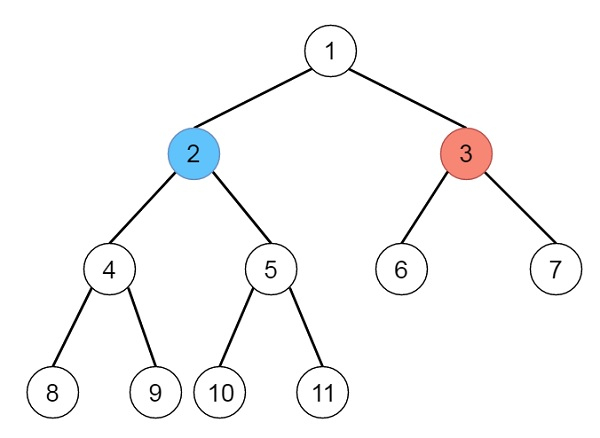
 Data Structure
Data Structure Networking
Networking RDBMS
RDBMS Operating System
Operating System Java
Java MS Excel
MS Excel iOS
iOS HTML
HTML CSS
CSS Android
Android Python
Python C Programming
C Programming C++
C++ C#
C# MongoDB
MongoDB MySQL
MySQL Javascript
Javascript PHP
PHP
- Selected Reading
- UPSC IAS Exams Notes
- Developer's Best Practices
- Questions and Answers
- Effective Resume Writing
- HR Interview Questions
- Computer Glossary
- Who is Who
Binary Tree Coloring Game in Python
Suppose there are two players play a turn-based game on a binary tree. We have the root of this binary tree and the number of nodes n in the tree. Here n is odd, and each node has a distinct value from 1 to n. At first, the first player names a value x with 1 <= x <= n, and the second player names a value y with 1 <= y <= n and that holds a condition, such that y != x. The first player colors the node with value x red, and the second player colors the node with value y blue. After that, the players take turns starting with the first player. In each turn, player takes a node of their color (red for player 1, blue for player 2) and colors an uncolored neighbor of the chosen node (either left or right child, or parent of the taken node.). If and only if a player cannot take such a node in this way, they must pass their turn. If both players pass their turn, the game will be ended, and the winner is the player that colored more nodes.
Suppose we are the second player. If it is possible to choose such a y to ensure we win the game, return true. If it is not possible, return false.
So if the tree is like −

and n is 11 and x is 3, then the output will be true, as the second player can take the node with value 2
To solve this, we will follow these steps −
Define a method called solve(), this will take node, x, l and r, the l and r are initially false, this will act like below −
if node is not present, then return and exit
if l is true, then increase leftVal by 1, otherwise when r is true, then increase rightVal by 1
if node value is x, then call solve(left of node, x, true, false) and call solve(right of node, x, false, true)
otherwise call solve(left of node, x, l, r) and call solve(right of node, x, l, r)
The main method will be like −
nodeToX := 0, leftVal := 0, rightVal := 0
call solve(root, x, false, false)
nodeToX := n – leftVal – rightVal – 1
temp := maximum of rightVal, nodeToX and leftVal
return false if (nodeToX + leftVal + rightVal – (2*temp) >= 0), otherwise true
Example(Python)
Let us see the following implementation to get a better understanding −
class TreeNode: def __init__(self, data, left = None, right = None): self.data = data self.left = left self.right = right def insert(temp,data): que = [] que.append(temp) while (len(que)): temp = que[0] que.pop(0) if (not temp.left): if data is not None: temp.left = TreeNode(data) else: temp.left = TreeNode(0) break else: que.append(temp.left) if (not temp.right): if data is not None: temp.right = TreeNode(data) else: temp.right = TreeNode(0) break else: que.append(temp.right) def make_tree(elements): Tree = TreeNode(elements[0]) for element in elements[1:]: insert(Tree, element) return Tree class Solution(object): def btreeGameWinningMove(self, root, n, x): self.nodeToX = 0 self.leftVal = 0 self.rightVal = 0 self.solve(root,x) self.nodeToX = n - self.leftVal - self.rightVal - 1 temp = max(self.rightVal,max(self.nodeToX,self.leftVal)) return not (self.nodeToX + self.leftVal + self.rightVal - (2*temp)>=0) def solve(self,node,x,l= False,r = False): if not node: return if l: self.leftVal+=1 elif r: self.rightVal+=1 if node.data == x: self.solve(node.left,x,True,False) self.solve(node.right,x,False,True) else: self.solve(node.left,x,l,r) self.solve(node.right,x,l,r) ob = Solution() root = make_tree([1,2,3,4,5,6,7,8,9,10,11]) print(ob.btreeGameWinningMove(root, 11, 3))
Input
[1,2,3,4,5,6,7,8,9,10,11] 11 3
Output
true

